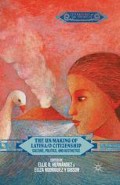Abstract
Neoliberalism describes the nexus of political, economic, and cultural forces that shape notions of subjectivity, agency, and community under globalization. It is both the context and content of transnational capitalism; both Ugly Betty (2006–2010) and RuPaul’s Drag Race (2009-present) are its products, and their success can partly be attributed to the ways in which both can be read as either postracial or multicultural televisual spaces. Mass media representations of race, class, gender, and sexuality matter to how we understand both the ways neoliberalism obscures its organizing structures, and conversely, the ways in which mass media representations can make those structures visible for critique. Both Ugly Betty and RuPaul’s Drag Race explicitly thematize self-fashioning, and Latina/o subjectivity is articulated in a Latina/o camp register in a way that presents challenges to neoliberal models of subjectivity and citizenship. These challenges, however, depend on humor. Drawing on queer Chicano and Latino theories of camp and utopia, I argue that Latina/o camp articulates the ironies and contingencies of resistance on television. Latina/o camp can operate as part of an oppositional consciousness that is differential and potentially generative of sites of contestation (Sandoval 1998).
Honey, I’m a Latina girl, and I only have two options in this country — being a housekeeper or being a stripper, bitches. And you all know I didn’t came here to clean toilets, baby.
—Alexis Mateo, RuPaul’s Drag Race
* Special thanks to Tanya Gonzalez. Many of my ideas here were initially developed in conversation with her in our collaboration and coauthorship of Funny Looking: Humor, Latina/o Camp, and Ugly Betty.
Access this chapter
Tax calculation will be finalised at checkout
Purchases are for personal use only
Preview
Unable to display preview. Download preview PDF.
References
“A Nice Day for a Posh Wedding.” 2007. Written by Silvo Horta, Directed by James Hayman. Ugly Betty: the Complete Second Season. Buena Vista Home Entertainment. DVD.
Anderson, Benedict. 1991. Imagined Communities: Reflections on the Origin and Spread of Nationalism. London:Verso.
Basil, Toni. 1982. “Mickey” Word of Mouth, Chrysalis Records.
Beltrán, Mary. 2009. Latina/o Stars in US. Eyes: The Making and Meanings of Film and TV Stardom Urbana: University of Illinois Press.
Butler, Judith. 1990. Gender Trouble: Feminism and the Subversion of Identity. New York: Routledge.
—. 2002. “Imitation and Gender Insubordination,” in Inside Out: Lesbian Theories, Gay Theories. Edited by Diana Fuss. London: Taylor & Francis, 13–31.
Chow, Rey. 2002. The Protestant Ethnic and The Spirit of Capitalism. New York: Columbia University Press.
Cleto, Fabio, ed. 1999. Camp: Queer Aesthetics and the Performing Subject: A Reader. Ann Arbor: University of Michigan Press.
Contreras, John. 2005. Unrequited Love and Gay Latino Culture: What Have You Done to My Heart. New York: Palgrave Macmillan.
Davila, Arlene. 2008. Latino Spin: Public Image and the Whitewashing of Race. New York: New York University Press.
Duggan, Lisa. 2003. The Twilight of Equality?: Neoliberalism, Cultural Politics, and the Attack on Democracy. Boston: Beacon Press.
Dyer, Richard. 1998. Stars. London: BFI.
García, Ramón. 2006. “Against Rascuache: Chicano Camp and the Politics of Identity in Los Angeles,” in The Chicana/o Cultural Studies Reader. Edited by Angie Chabram-Dernersesian. New York: Routledge, 211–223.
Gledhill, Christine. 1991. Stardom: Industry of Desire. New York: Routledge.
Gordon, Ian and Tanseem Raja. 2012. “164 Immigration Laws Passed Since 2010? A MoJo Analysis.” Mother Jones March/April 2012. http://motherjones.com/politics/2012/03/anti-immigration-law-database
“Life, Liberty, and The Pursuit of Style.” 2011. RuPaul’s Drag Race. Originally aired March 14, 2011 on Logo. Accessed via Netflix streaming January 15, 2012.
Lowe, Lisa. 1997. “Work, Immigration, Gender: New Subjects of Cultural Politics,” in The Politics of Culture in the Shadow of Capital. Edited by Lisa Lowe and David Lloyd. Durham: Duke University Press, 354–374.
Miller, Toby. 2007. Cultural Citizenship: Cosmopolitanism, Consumerism, and Television in a Neoliberal Age. Philadelphia: Temple University Press.
Muñoz, José Esteban. 2009. Cruising Utopia: The Then and There of Queer Futurity. New York: New York University.
Negrón Mutaner, Frances, ed. 2006. None of the Above, Puerto Ricans in the Global Era. New York: Palgrave Macmillan.
Nericcio, William. 2007. Tex[t]-Mex: Seductive Hallucinations of the “Mexican” in America. Austin: University of Texas Press.
Ong, Aihwa. 1996. “Cultural Citizenship as Subject-Making: Immigrants Negotiate Racial and Cultural Boundaries in the United States.” Current Anthropology Vol. 37, No. 5: 737–762.
—. 2006. Neoliberalism as Exception. Durham: Duke University Press.
Ramirez Berg, Charles.2002. Latino Images in Film: Stereotypes, Subversion, and Resistance. Austin: University of Texas Press.
Rodriguez, Clara. 2004. Heroes, Lovers, and Others: The Story of Latinos in Hollywood. Washington, DC: Smithsonian Books.
Rosaldo, Renato. 2008. “Cultural Citizenship in San Jose, CA.” Polar Vol. 17: 57–63.
“Ru Ha Ha.” 2011. RuPaul’s Drag Race. Originally aired March 7, 2011 on Logo. Accessed via Netflix streaming January 15, 2012.
RuPaul. 2011. “Superstar” Glamazon. Itunes.
—. 1993. “Supermodel (You Better Work)” Supermodel of The World. Tommy Boy Records.
Sandoval, Chela. 1998. “Mestizaje as Method: Feminists-of-Color Challenge the Canon,” in Living Chicana Theory. Edited by Carla Trujillo. Berkeley: Third Woman Press, 358–370.
Sontag, Susan. 1966. Against Interpretation. New York: Picador.
Soto, Sandra K. 2010. Reading Chican@ Like a Queer: The DeMastery of Desire. Austin: University of Texas Press.
Thalia. 1998. “Echa pa’lante” Dance with Me: Music from the Motion Picture. Sony.
—. 1997. “Echa pa’lante” Amor a la Mexicana. EMI Latin.
“Totally Leotarded.” 2012. RuPaul’s Drag Race. Originally aired February 7, 2011 on Logo. Accessed via Netflix streaming January 15, 2012.
Editor information
Copyright information
© 2014 Ellie D. Hernández and Eliza Rodriguez y Gibson
About this chapter
Cite this chapter
Gibson, E.R.y. (2014). Chapter 2 Drag Racing the Neoliberal Circuit: Latina/o Camp and the Contingencies of Resistance. In: Hernández, E.D., Gibson, E.R.y. (eds) The Un/Making of Latina/o Citizenship. Literatures of the Americas. Palgrave Macmillan, New York. https://doi.org/10.1057/9781137431080_3
Download citation
DOI: https://doi.org/10.1057/9781137431080_3
Publisher Name: Palgrave Macmillan, New York
Print ISBN: 978-1-137-43107-3
Online ISBN: 978-1-137-43108-0
eBook Packages: Palgrave Media & Culture CollectionLiterature, Cultural and Media Studies (R0)

